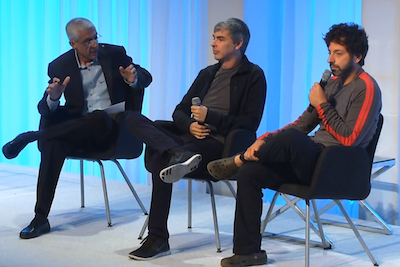 During a fireside chat at the annual Khosla Ventures CEO summit, investor Vinod Khosla talked to Google co-founders Larry Page and Sergey Brin about Google becoming a health company one day. As David Shaywitz wrote in a column for Forbes, Page and Brin see their company's health initiatives as "cool" projects, but they argue because of all the red tape in healthcare they are ultimately not interested in pursuing it fully.
During a fireside chat at the annual Khosla Ventures CEO summit, investor Vinod Khosla talked to Google co-founders Larry Page and Sergey Brin about Google becoming a health company one day. As David Shaywitz wrote in a column for Forbes, Page and Brin see their company's health initiatives as "cool" projects, but they argue because of all the red tape in healthcare they are ultimately not interested in pursuing it fully.
Here's how that part of the conversation went:
Khosla asked: "Can you imagine, given your interests -- you've had some interest in health. There's some radical stuff there. Android is a natural platform for health. Mobile is. And health needs to be distributed and highly accessible - broadly, not just at the hospital. Can you imagine Google becoming a health company? Maybe a larger business than the search business or the media business?"
"I think it's, for sure, a larger business," Brin replied. "In fact, [at] Google X -- for example -- we do have the glucose reading contact lenses."
Page chimed in: "Which are very cool."
"I don't wear them," Brin said. "Well, I don't wear contacts, and I don't have the need to measure my glucose. But they should be coming along pretty well. I'm very excited about that. Generally, health is just so heavily regulated. It's just a painful business to be in. It's just not necessarily how I want to spend my time. Even though we do have some health projects, and we'll be doing that to a certain extent. But I think the regulatory burden in the U.S. is so high that think it would dissuade a lot of entrepreneurs."
Page then pointed out that Google did co-launch a new biotech business called Calico that is focused on health and longevity. He made a distinction between that "pretty independent effort" and the opportunities presented by health data.
"I'm really excited about [Calico]," he said. "I am really excited about the possibility of data also, to improve health. But that's -- I think what Sergey's saying, it's so heavily regulated. It's a difficult area. I can give you an example. Imagine you had the ability to search people's medical records in the U.S. Any medical researcher could do it. Maybe they have the names removed. Maybe when the medical researcher searches your data, you get to see which researcher searched it and why. I imagine that would save 10,000 lives in the first year. Just that. That's almost impossible to do because of HIPAA. I do worry that we regulate ourselves out of some really great possibilities that are certainly on the data-mining and..."
Google, of course, famously shuttered its PHR platform Google Health a few years ago as part of Page's re-ascension to CEO of Google. He shutdown a number of projects to help re-focus the company. More recently Google launched Google Fit, a fitness data platform similar to Apple's HealthKit and Health app, but with a decidedly fitness-focus instead of a health one.
Khosla then went on to share two interesting details about digital health companies Ginger.io and WellDoc. Ginger.io, which is a Khosla Ventures portfolio company, deployed its technology at Kaiser Permanente and during the first week the app helped save the lives of three suicidal patients, Khosla revealed on-stage. Khosla said that digital health "feels like a software business" that is "delivered mostly through mobile" and it's really need in less regulated parts of the world like in India and parts of Africa.
Khosla also shared a pricepoint for WellDoc's Bluestar offering -- without specifically naming the company or its product. WellDoc has told MobiHealthNews in the past that BlueStar's pricepoint actually varies a bit depending on the payer. The company has often said that BlueStar is priced at a third of the cost of other diabetes prescription therapies, which typically cost between $250 to $45o a month.
"In fact, most people may not know this, but the first mobile app got approved as a pharmaceutical because it's directly competitive with metformin, which is the principle drug for blood sugar reduction," Khosla said. "So it has the same effect, and the FDA approved it. Of course, with the funny caveat that it has to be refilled every three months, and it's priced at $182 a month."
Medi-Span lists WellDoc's BlueStar therapy as having an average wholesale price of $222 and a wholesale acquisition cost of $185, according to an April report in Inside Pharmacy magazine.
When it comes to the FDA, WellDoc has actually secured a series of Class II medical device clearances from the agency and is registered as a pharmaceutical product with the FDA, too. While it wasn't the first mobile medical app to get 510(k) clearance from the FDA, it was the first to get listed in formularies alongside pharmaceuticals and the first to get payers to pay for the app as they would non-digital therapies. That made it the first truly prescribable mobile medical app, or as the American Diabetes Association calls it, the first in a new class of treatments known as mobile prescription therapy.

















